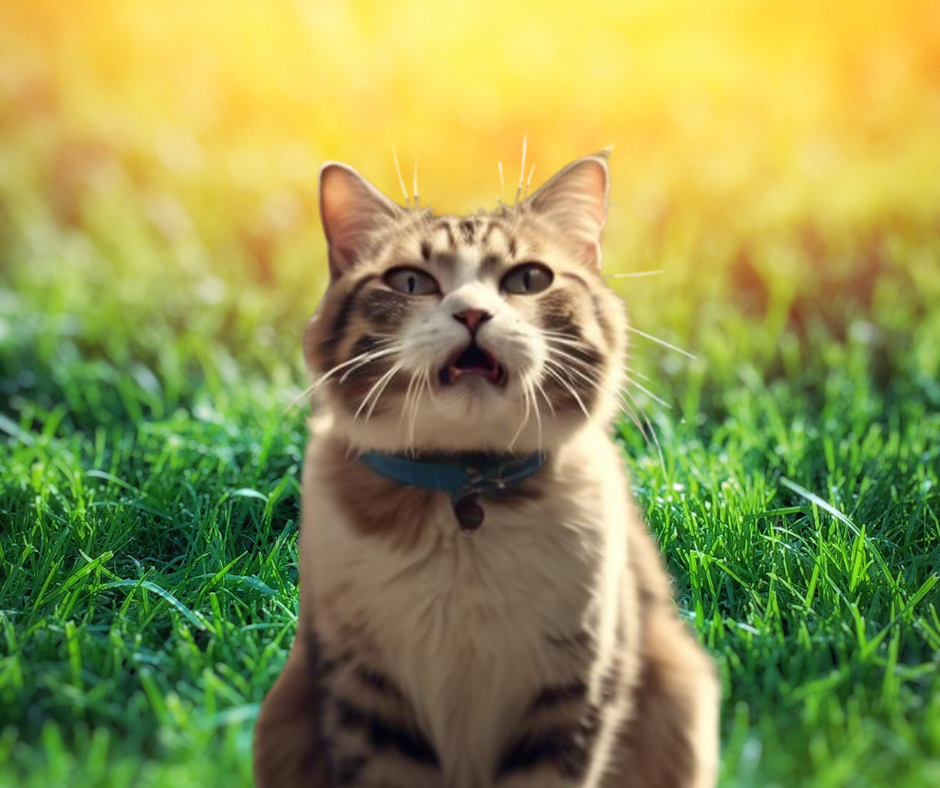How Do I Get My Cat To Stop Spraying

How Do I Get My Cat To Stop Spraying is a common question you might be asking if you’ve ever had to deal with the unpleasant surprise of finding your cat’s territorial spray marks around your home, you know how frustrating and challenging it can be.
But fear not, there are effective ways to address this issue and help your cat break the habit. From creating a stress-free environment to providing positive associations with marked areas, this discussion will explore various strategies to put an end to your cat’s spraying behavior. So, if you’re tired of dealing with the pungent odor and unsightly stains, keep reading to discover the solutions that can bring peace back to your home and restore harmony between you and your feline friend.
Understanding Spraying Behavior
To understand spraying behavior in cats, it is essential to differentiate between urinating and spraying, as they serve different purposes and exhibit distinct behaviors. While urinating is a normal bodily function that cats perform in their litter boxes, spraying is a form of communication where cats release small amounts of urine on vertical surfaces. Spraying serves as a way for cats to mark their territory, communicate with other cats, and express their emotions.
When a cat sprays, they typically stand upright with their tail held high and quivering. They will then aim their spray at a wall, furniture, or other vertical surfaces. The spray itself is usually a small amount of urine that contains pheromones, which provide information about the cat’s identity and status to other cats in the area.
Understanding the reasons behind spraying behavior is crucial in order to address and prevent it. Cats may spray due to stress, medical issues, mating behavior, marking territory, or even problems with their litter box. If your cat is spraying, it is essential to identify the underlying cause and address it accordingly.
To stop your cat from spraying, consider implementing strategies such as providing stress relief, cleaning marked areas with an enzymatic cleaner to remove the scent, and neutering your cat if they are not already. Environmental modifications, such as creating vertical spaces for your cat to climb and providing multiple litter boxes, can also help deter spraying behavior.
In some cases, it may be necessary to consult a veterinarian for further assistance. They can evaluate your cat’s health and provide recommendations for additional solutions, such as changing the type of litter, using pheromone diffusers, or prescribing medication if necessary.
Understanding the distinction between urinating and spraying behavior and addressing the underlying causes can help you effectively manage and prevent spraying in your cat.
Identifying the Reasons Behind Spraying
Identifying the reasons behind spraying behavior in cats requires careful observation and consideration of various factors. Cats may spray for a variety of reasons, and understanding these reasons can help you address the issue effectively. One common reason why cats spray is to mark their territory. By spraying, cats leave a scent mark that signals their presence and asserts their ownership.
This behavior is more common in unneutered males, but can also be seen in females and neutered males. Another reason why cats spray is stress or anxiety. Changes in the environment, such as moving to a new home or the introduction of a new pet, can trigger spraying behavior. Providing a safe and secure environment and reducing stressors can help alleviate this behavior.
Litter box issues can also contribute to spraying behavior. Cats are naturally clean animals and prefer a clean litter box. If the litter box is dirty or in an undesirable location, cats may choose to spray instead. Ensuring that the litter box is cleaned regularly and placed in a quiet and accessible area can help prevent spraying.
Medical problems, such as urinary tract infections, can also cause cats to spray. If your cat suddenly starts spraying and there are no apparent environmental or behavioral factors, it is important to consult a veterinarian to rule out any underlying medical conditions.
Providing a Stress-Free Environment
After understanding the reasons behind spraying behavior in cats, it is important to focus on providing a stress-free environment for your furry friend. A stress-free environment can greatly reduce the likelihood of urine spraying outside the litter box. One way to achieve this is by providing attention, playtime, and new toys to reduce anxiety in your cat. Engaging in interactive play sessions can help release pent-up energy and provide mental stimulation, which can help alleviate stress. Additionally, make sure to set aside dedicated time each day for bonding and affection with your cat.
Another important aspect of creating a stress-free environment is to eliminate the scent of sprayed areas. Use enzyme-based cleaners to remove the odor completely, as regular cleaners may not fully eliminate the smell. After cleaning, repurpose these spots for play or feeding to make them positive spaces for your cat. By associating these areas with positive experiences, your cat will be less likely to spray in those locations.
If you have multiple cats, it is crucial to provide each cat with their own resources, such as litter boxes, food, and water bowls. This will help reduce competition and territorial disputes, which can lead to spraying behavior. Additionally, neutering male cats can significantly decrease the likelihood of marking, as it reduces their desire to establish territory.
To minimize stress from outside stimuli, prevent your cat from seeing other cats through windows by closing blinds or using opaque window coverings. This reduces the likelihood of territorial marking triggered by the presence of other cats.
If despite your efforts, your cat continues to spray, it may be a sign of an underlying medical condition, such as lower urinary tract disease. In such cases, it is important to consult a veterinarian for a thorough examination and proper diagnosis. They may recommend anti-anxiety medications or suggest changing the type of litter to address the spraying behavior. Creating a stress-free environment is crucial in helping your cat overcome spraying behavior and promoting their overall well-being.
Creating Positive Associations With Marked Areas
Create positive associations with marked areas by using positive reinforcement and providing interactive toys near the marked area to encourage play and positive experiences. When it comes to cat spraying or urine marking, creating positive associations with marked areas can help deter this behavior. Positive reinforcement involves rewarding your cat with treats or praise when they use the marked area appropriately. This will help them associate the marked area with positive experiences and encourage them to continue using it.
In addition to positive reinforcement, providing interactive toys near the marked area can also be beneficial. Cats have a natural instinct to play, and by placing toys near the marked area, you are providing them with an incentive to spend time in that area. This can help divert their attention away from spraying and towards engaging in play and positive experiences. Interactive toys such as puzzle toys, feather wands, or treat-dispensing toys can keep your cat entertained and mentally stimulated, reducing the likelihood of them resorting to spraying.
Using pheromone diffusers, such as Feliway, can also help create a calming and positive environment around marked areas. These diffusers release synthetic pheromones that mimic the ones produced by cats when they feel safe and secure. By using these diffusers near marked areas, you can help reduce your cat’s stress levels and decrease the likelihood of them spraying.
Redirecting your cat’s attention is another effective strategy. By placing scratching posts or feeding stations near marked areas, you can redirect their focus and energy towards these designated areas. Cats often mark vertical surfaces, so providing them with appropriate scratching posts can help satisfy their natural urge to scratch and mark territory. Similarly, placing feeding stations near marked areas can help associate that space with positive experiences, as cats often view feeding as a positive and rewarding activity.
Lastly, it is important to ensure that the marked area is in a quiet and comfortable spot. Cats are more likely to spray outside the litter box if they feel anxious or threatened. By providing them with a secure and relaxing environment, you can help alleviate their stress and reduce the urge to spray.
Considering Spaying or Neutering
To address the issue of cat spraying, one effective solution to consider is spaying or neutering your cat. Cats spray urine on vertical surfaces as a way to mark their territory or communicate with other cats. By getting your cat spayed or neutered, you can help reduce or even eliminate this behavior.
When a cat is spayed or neutered, their reproductive organs are surgically removed. This procedure is particularly beneficial for male cats, as intact male cats are more likely to spray urine to mark their territory and attract mates. By neutering your male cat, you can greatly decrease the likelihood of spraying behavior.
Spaying or neutering your cat not only helps prevent spraying, but it also has other positive effects on their behavior. This procedure can decrease territorial marking and minimize the impact of mating behaviors. Additionally, spaying or neutering contributes to your cat’s overall health and wellbeing.
It is recommended to consult a veterinarian to discuss the benefits and potential timing for spaying or neutering your cat. They will be able to provide you with the necessary information and guidance to make an informed decision. While this procedure is commonly done when cats are young, it can also be done on adult cats.
Spaying or neutering is a reliable, long-term solution to prevent spraying behavior in cats. By addressing the root cause, you can create a more pleasant living environment for both you and your cat. Remember, a neutered cat is a happier and more content cat.
Implementing Environmental Changes
Implementing environmental changes can be an effective way to address cat spraying behavior. When dealing with this issue, it’s important to create an environment that reduces stress and discourages marking territory. One approach is to provide stress relief for your cat. Spend time playing with and petting your cat to offer attention and alleviate any anxiety they may be experiencing. Introducing new toys or catnip can also help to distract them from marking behavior.
Cleaning and repurposing marked areas is another important step. Use enzyme-based, scent neutralizing cleaners to thoroughly clean any spots that have been sprayed. This will help remove the scent that encourages your cat to continue marking. Once the area is clean, consider repurposing it for play or feeding to divert your cat’s attention away from marking.
Spaying or neutering your cat is a highly recommended step to prevent marking. This procedure is the most reliable way to stop spraying behavior in cats. It can help reduce the hormones that drive them to mark their territory.
Closing the blinds can also be an effective strategy. By keeping the blinds closed, you prevent your cat from seeing other cats outside. This reduces their instinctual need to mark their territory in response to perceived threats or competition.
In some cases, you may need to consider making changes to the litter box. Experiment with different types of litter or litter boxes to find what your cat prefers. It’s also important to consult with a vet in case there is an underlying medical problem that is causing your cat to spray. They may recommend anti-anxiety medications to help alleviate the behavior.
Implementing these environmental changes, along with the other strategies discussed, can significantly reduce cat spraying behavior. By creating a stress-free environment and addressing any underlying issues, you can help your cat feel more secure and prevent unwanted marking.
Managing Litter Box Preferences
When it comes to addressing cat spraying behavior, one important aspect to consider is managing your cat’s litter box preferences. Making sure your cat has a positive experience with their litter box can help prevent them from peeing outside the box. Here are some practical tips to help your cat develop good litter box habits.
First and foremost, it’s crucial to keep the litter box clean and odor-free. Cats are naturally clean animals, and a dirty litter box may discourage them from using it. Scoop the litter box at least once a day and change the litter regularly to maintain cleanliness.
Providing multiple litter boxes in different locations can also be beneficial, especially if you have multiple cats or a large home. This gives your cat options and allows them to choose the litter box that suits them best. Additionally, experiment with different types of litter to find the one your cat prefers. Some cats may prefer clumping litter, while others may prefer non-clumping or even natural alternatives like shredded newspaper or wood pellets.
Make sure the litter box is easily accessible to your cat. This is particularly important for elderly cats or kittens who may have difficulty reaching high-sided litter boxes. Consider using a litter box with low sides or providing a ramp for easy access.
Avoid using scented litter, as most cats prefer unscented options. Cats have a highly sensitive sense of smell, and strong scents may deter them from using the litter box. Stick to unscented litter to ensure your cat feels comfortable using it.
Lastly, if you have a male cat that has not been neutered or a female cat that has not been spayed, consider getting them sterilized. Medical conditions, such as urinary tract infections or hormonal imbalances, can contribute to inappropriate elimination behaviors. Getting your cat spayed or neutered can help prevent these issues and reduce the likelihood of spraying behavior.
Seeking Veterinary Advice
If your cat is still spraying despite your best efforts, it’s time to seek veterinary advice. A veterinarian can provide expert recommendations and professional guidance to help address your cat’s spraying behavior. Consulting a feline specialist will ensure that any underlying medical issues are ruled out and that you receive personalized treatment plans tailored to your cat’s specific needs.
Vet’s Expert Recommendations
Have you consulted a vet to rule out any medical issues and receive expert recommendations on how to stop your cat from spraying? Seeking the vet’s expert recommendations is crucial in addressing this behavior. The first step is to ensure that there are no underlying medical conditions causing the spraying. Your vet will conduct a thorough examination and may recommend tests if necessary.
Spaying or neutering your cat is often advised as it can help reduce spraying behavior in most cases. Additionally, your vet might suggest using pheromone diffusers or anti-anxiety medications to alleviate stress and minimize marking in cats. If the issue persists, it is wise to seek guidance from a certified behaviorist or veterinary behaviorist recommended by your vet. They can provide effective strategies tailored to your cat’s specific needs. Stay informed and consult with professionals for ongoing support and advice.
Professional Guidance for Cats
To effectively address your cat’s spraying behavior, seeking professional guidance from a veterinarian is crucial. Your vet can help determine the underlying reasons your cat is spraying and provide tailored advice for your specific situation. They may suggest behavioral modifications, such as ensuring your cat has plenty of stimulation and environmental enrichment, or recommend anti-anxiety medications if necessary. Neutering can also help deter spraying in intact males.
Additionally, your vet may recommend using pheromone diffusers like Feliway to make your cat more comfortable and less likely to spray. It’s important to consult with your veterinarian because they can rule out any medical causes for the spraying, such as urinary tract infections. They can also provide guidance on proper litter box usage and maintenance, including providing multiple litter trays, cleaning them regularly, and choosing appropriate box sizes. Remember, never punish your cat for spraying, as it can worsen the behavior and cause your cat to become more stressed.
Consulting a Feline Specialist
Scheduling an appointment with a feline specialist or veterinarian is essential when seeking professional guidance for your cat’s spraying behavior. Cats need the expertise of a feline specialist to accurately diagnose and address the issue. One cat spraying can be a sign of an underlying medical problem, such as a urinary tract infection or bladder stones. A feline specialist can conduct a thorough examination and run necessary tests to rule out any medical conditions.
Additionally, they can provide advice on behavioral modifications and environmental changes to prevent spraying. If necessary, a feline specialist may recommend anxiety-relieving medications or synthetic pheromone products to help reduce your cat’s stress levels and deter spraying. Consulting a feline specialist will ensure that you receive tailored advice and a comprehensive plan to address your cat’s spraying behavior.
Cleaning and Eliminating Odors
To effectively clean and eliminate odors caused by cat spraying, it is important to use enzymatic cleansers specifically designed to neutralize pet odors. These cleansers break down the odor-causing molecules and eliminate the smell at its source. Additionally, consider using synthetic cat pheromones to help relieve any stress or anxiety that may be contributing to the spraying behavior.
Odor-Eliminating Cleaning Products
Using enzymatic cleansers is an effective way to neutralize pet odors and eliminate the scent of cat spray. When your cat sprays or urinates outside of the litter box, it can be frustrating and leave behind strong odors. Enzymatic cleaners are specifically designed to break down the proteins in cat urine, eliminating the scent that attracts cats to mark their territory. These odor-eliminating cleaning products work by using enzymes to digest the organic matter, leaving your home smelling fresh and clean. It is important to avoid ammonia-based cleansers, as they can actually worsen the problem by mimicking the scent of cat urine. By using enzymatic cleaners, you can effectively eliminate odors and discourage your cat from house soiling.
Effective Odor Removal Techniques
To effectively eliminate odors caused by cat spraying, it is important to employ effective cleaning and odor removal techniques. When cleaning the marked areas, use enzyme-based cleaners specifically designed to neutralize scent. These cleaners break down the proteins in the urine, effectively eliminating the odor. Additionally, consider repurposing the sprayed area for play or feeding, as this can help make it a positive space for your cat and discourage further spraying.
To prevent your cat from spraying outside the box, close blinds or cover windows to prevent them from seeing other cats or animals that may trigger their spraying behavior. If the issue persists, it may be helpful to consult a vet who can provide further guidance and potentially prescribe anti-anxiety medications to address the underlying cause of the spraying.
Preventing Future Spraying Incidents
One effective way to prevent future spraying incidents in cats is to provide stress relief through play, petting, and offering new toys or catnip. Engaging your cat in play and providing them with toys or catnip can help reduce anxiety and stress, which are common triggers for spraying behavior. Spend quality time with your cat, engaging them in interactive play sessions and offering them plenty of affection and attention. This can help alleviate any underlying stress or anxiety they may be experiencing.
Another important step in preventing future spraying incidents is to clean marked areas thoroughly. Use enzyme-based, scent neutralizing cleaners to remove the scent of previous spraying incidents. Cats have a highly sensitive sense of smell, and if they can still detect the scent of urine in a particular area, they may be more likely to spray there again. By eliminating the scent, you can discourage your cat from returning to the same spot.
Additionally, it’s crucial to prevent visual triggers that may contribute to urine marking. Close blinds or use opaque window coverings to deter your cat from seeing other cats outside. The sight of other cats can often trigger spraying behavior as your cat may feel the need to mark their territory in response. By blocking their view, you can reduce the likelihood of spraying incidents.
How Do I Get My Cat To Stop Spraying Frequently Asked Questions
Can a Male Cat Be Stopped From Spraying?
Yes, a male cat can be stopped from spraying. Training techniques, environmental enrichment, neutering benefits, behavioral deterrents, understanding cat body language, and creating a stress-free environment can all help modify this behavior.
What Repels Male Cats From Spraying?
Natural deterrents, such as citrus scents and vinegar solutions, can repel male cats from spraying. Behavioral modifications, environmental enrichment, and neutering can also help. Scent-based repellents, cleaning solutions, and positive reinforcement techniques are effective tools to address this behavior.
Can You Remove a Cat’s Ability to Spray?
To stop your cat from spraying, consider behavioral training, neutering options, environmental enrichment, and pheromone sprays. If these methods fail, consult a vet for medication alternatives. Also, consider keeping your cat indoors to reduce spraying behavior.
What Home Remedy Will Keep Cats From Spraying?
To keep your cat from spraying, try natural deterrents like citrus or vinegar, behavior modification through positive reinforcement, and environmental enrichment with toys and scratching posts. Neutering also has benefits in preventing marking behavior.
Conclusion
In conclusion, by understanding your cat’s spraying behavior and addressing the underlying reasons, providing a stress-free environment, creating positive associations with marked areas, considering spaying or neutering, managing litter box preferences, seeking veterinary advice, and cleaning and eliminating odors, you can effectively stop your cat from spraying. Remember to be patient and persistent in implementing these strategies to create a peaceful and odor-free home for both you and your cat.








